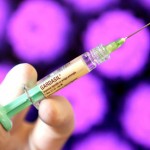 Tomorrow (April 24th) begins World Immunization Week, a campaign started by the World Health Organization (WHO) to increase worldwide efforts to immunize children against a variety of life threatening preventable diseases. One message the WHO is pushing this year is that current efforts to immunize the children of the world are off track. They estimate that 1 in 5 children are still missing out on routine vaccinations, a gap that if closed could save over a million lives annually.
Tomorrow (April 24th) begins World Immunization Week, a campaign started by the World Health Organization (WHO) to increase worldwide efforts to immunize children against a variety of life threatening preventable diseases. One message the WHO is pushing this year is that current efforts to immunize the children of the world are off track. They estimate that 1 in 5 children are still missing out on routine vaccinations, a gap that if closed could save over a million lives annually.
In California, the fight to eliminate the state s personal belief exemption from childhood vaccination requirements crossed a major hurdle. Last week, the State Senate s Education Committee decided, after listening to over 2 hours of testimony, to delay voting on the bill one week in order to allow time for the bill s writers to work out some of the committee s initial criticisms. The changes, which allow for more home schooling options for the children of anti-vaxx parents, appeased most of the members as the bill passed decisively 7-2. The bill s next stop on its tortuous journey through the California Legislature is the State Senate s Judiciary Committee, where the conversation will shift to the legality of the bill. There is some hope the bill could move through the judiciary committee expeditiously as all of its members are either bill co-sponsors or have voted in favor of it in other sub-committees.
The HPV vaccine has garnered a lot of news coverage in the past week, for instance in the pages of JAMA, where health news columnist Rita Rubin examines the reasons why vaccination rates for HPV are severely lagging behind rates for other vaccines that are recommended for teenagers. Eighty-six percent of American teens have received the Tdap vaccine (for tetanus, diphtheria and pertussis) while 78 percent have received the meningitis vaccine. In contrast, only 34 percent of teenage boys and 54 percent of teenage girls had received 1 of the recommended 3 doses of the Gardasil vaccine (the most common HPV vaccine which is approved for both sexes). Rubin points out that along with the absurd misconception that the vaccine promotes sexual promiscuity, other factors contribute to these low rates: only 2 states, Virginia and Rhode Island (and Washington D.C.) require middle school children to receive the HPV vaccine before attending school. Compare that to the 46 states that require the Tdap vaccine. Another reason, Rubin explains, is that pediatricians are not recommending it as strongly as they do with other vaccines. In a recent survey, 61 percent of parents said their physician had not recommend the HPV vaccine for their child.
In Florida, the State s Department of Health has now confirmed 4 new cases of measles this week, all among unvaccinated people including one child. The cases, currently confined to Indian River and St. Lucie County, are the first recorded cases of measles in central Florida since 2013.
Finally, an Australian anti-vaccination group is deservedly receiving widespread criticism today for this ad posted on the group s Facebook page. All actions of anti-vaxx groups are deplorable, but this one reaches new lows for the movement in both decency and morality. The post, which compares being vaccinated to being forcibly raped, has since been deleted, however, it demonstrates the length the anti-vaxx movement will go to promote their fictitious agenda.

